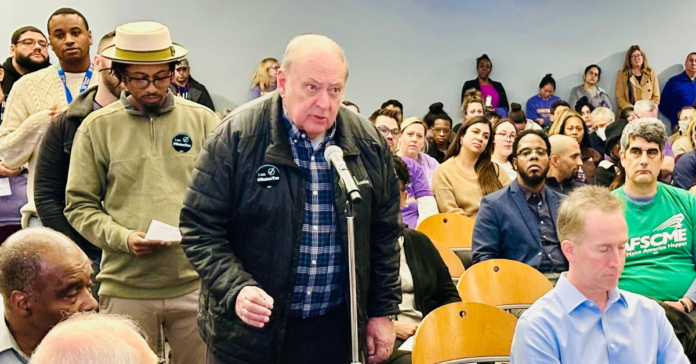Working people face significant obstacles to achieving a better life if anticipated policies pushed by the new administration in the White House materialize. In a recently published letter to the editor, the former president of our AFT Connecticut-affiliated CSU-AAUP proposed a bold policy plan of action in 2025 to shield fellow Nutmeggers. Dave Walsh (speaking in photo, above), a retired Southern Connecticut State University political science professor, urged the governor and legislators prioritize “the well-being of residents over ideological austerity:”
As Connecticut looks ahead to 2025, we are facing a new state legislature and a budget fight that has already proven itself to be a difficult and tenuous obstacle for these newly elected officials. At the federal level we are looking at a Republican-controlled House and Senate with President-Elect Donald Trump steadfast in cutting federal spending drastically with his newly formed “DOGE,” or Department of Government Efficiency, headed by anti-worker billionaire Elon Musk.
This landscape underscores a new and urgent challenge for our state legislature while they debate the next biennium budget – how to safeguard against Donald Trump’s cuts to federal funding. These cuts, coupled with our state’s archaic fiscal policies, leave Connecticut residents vulnerable at a time when bold action is needed.
Click here for reporting on the U.S. labor movement’s national response to the Trump Administration’s harmful policies.
The question before us is clear: will our Democratic majorities rise to the occasion, shedding outdated fiscal restrictions to secure a better future, or will they hesitate, allowing Connecticut to remain shackled by policies rooted in austerity and aligned with far-right think tanks like the Yankee Institute, Project 2025 and the Heritage Foundation?
Project 2025 outlines a blueprint for sweeping federal cuts to programs that Connecticut relies on – and receives significant federal funding for. From Medicaid, Medicare and SNAP to infrastructure and public education grants, the very programs that Connecticut residents rely on to sustain working families, create jobs and invigorate our economy are being threatened.
And with our current services already struggling to serve our communities, it wouldn’t take much federal cutting to leave our residents hamstrung. Every day we see headlines from local outlets talking about public K-12 schools that are crumbling from underfunding, and at the next level our public colleges and universities have already made drastic cuts and raised tuition in the last year to deal with hundreds of millions in deficit. Health and human service programs are struggling to answer the growing need in our communities while facing a continued recruitment and retention crisis.
Click here for press reporting on collective calls for state elected leaders to fund Connecticut’s future.
This underinvestment extends to public services, from mental health care to affordable housing. And in homes at our kitchen tables? Families are playing Russian roulette with their outstanding bills and weighing whether they can afford both rent and groceries on a month to month basis.
Our communities are already crying out for help. If even a fraction of the roughly $7 billion that Connecticut receives from the federal government is cut, those cries will turn to screams.
And despite these looming threats, Connecticut remains hamstrung by a set of restrictive fiscal policies – commonly referred to as fiscal “guardrails” – that limit our ability to respond. Instead of facilitating long-term investments, they prioritize aggressive and irresponsible debt repayment over meeting present-day needs.
Click here for reporting on a local union leader’s commitment to engaging communities in removing obstacles to progress.
If you know your roof is about to cave in, would you dump all of your savings into extra mortgage payments? No, you would pay to get your roof fixed.
This self-imposed austerity is no accident. These policies come right out of the playbook of the extreme right from groups like the Heritage Foundation, Koch Brothers and Connecticut’s Yankee Institute. These groups frame government spending as inherently wasteful while pushing for privatization and tax cuts for the wealthy. They champion policies designed to shrink government, weaken public services, and exacerbate inequality and when you combine these policies with the proposed federal cuts, they would send Connecticut into a downward spiral of underinvestment and widening inequality.
But there is a solution. Connecticut has a strong Democratic majority in both the House and Senate along with a Democratic governor who could choose to enact bold policies that safeguard our state from this treacherous path. They have a choice to make – will they defend outdated fiscal policies that limit our ability to respond to crises, or will they stand up and protect our state from right-wing attacks at the federal level? Their decision this year will have lasting impacts on Connecticut’s future generations.
Click here for a labor leader and non-profit ally’s recent response to special interests’ defense of fiscal roadblocks.
Successful safeguarding will include a reform of our fiscal guardrails, including a bold modification of the volatility cap which is siphoning off $1.4 billion a year from our programs. It will also include the adoption of progressive taxation, a new system that doesn’t disproportionately burden working families, but generates revenue from the wealthiest residents who currently pay a much smaller share of their income to state and local taxes. With these newly adjusted streams of revenue we have to make strong investments in our public services and programs to ensure our schools are fully funded, our communities have access to affordable healthcare and our public services are fully staffed.
Connecticut stands at a crossroads. The combination of federal cuts and restrictive state policies threatens to unravel decades of progress. Yet, this moment also presents an opportunity to chart a new course – one that prioritizes the well-being of residents over ideological austerity.
To seize this opportunity, Connecticut’s Democratic leaders must be bold. The question is no longer whether we can afford to act – the question is whether we can afford not to.
Click here for Walsh’s original published letter to the editor of CT Examiner.



